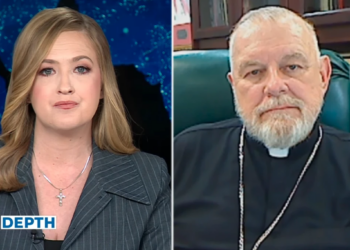Garvan Walshe is a former national and international security policy adviser to the Conservative Party. He runs Article 7 – Intelligence for democrats.
Machiavelli has taught us thata leader owes duties to his state, and the glory — these days we might say the success — of his state allows him, perhaps obliges him, to commit what in normal life would be considered crimes. By these Machiavellian standards Israeli Prime Minister Binyamin Netanyahu stands condemned.
Machiavelli’s permission is conditional. The crimes have to serve the interests of the state, and have to be carried out to success. There’s nothing worse, in his canon, than a failed criminal. Netanyahu’s crimes are many but the relevant ones now are those connected with his war in Gaza.
Israel’s enemies, from partisans of the Palestinian cause, to countries that see Israel as a colonial enterprise, to the instigators of South Africa’s premature accusation of genocide at the International Court of Justice, are already convinced of his guilt. Anyone who believes that certain kinds of warfare are impermissible, even in self-defence against an attack as bloody as Hamas’s on October 7, and against an an enemy that intermingles itself with the civilian population (itself as serious war crime), will likewise need no persuasion.
But Netanyahu’s conduct is wanting from the perspective of the Israeli national interest, and from the hard-nosed version of it that spawned the movement that would become the Likud party. This is the vision of Ze’ev Jabotinsky, whose “revisionist” Zionism was based on the uncomfortable truth that “we cannot offer any adequate compensation to the Palestinian Arabs in return for Palestine. And therefore, there is no likelihood of any voluntary agreement being reached.”
This sector of Israeli society sees conflict with the Palestinians as inevitable, the question for them is what outcome to that conflict can guarantee Israeli security. Jabotinsky did not argue for eternal war: the concluded his speech arguing that a sufficiently strong Israel could agree mutual concessions with Palestinian Arab leaders from which a stable arrangement could be achieved. This hard-nosed conclusion would motivate Ariel Sharon to withdraw Jewish settlements from Gaza (and, had he not suffered a stroke, extend the withdrawal to settlements in the West Bank). It is the stance that would guide Netanyahu’s own defence minister Yoav Gallant when, in May 2024 he argued against Israel taking over the government of the Gaza Strip and in favour of reaching a deal in which Hamas released the surviving hostages it had seized on October 7 and Israel withdrew. New authorities, backed by Arab states in the region and the United States would re-establish order in Gaza, and the October 7 war would have been brought to an end. Gallant was fired.
He was fired for reasons domestic and foreign. The domestic cause is that Netanyahu’s coalition depends on another group of Israeli politicians: the messianic extremists led by Belazel Smotrich and Itamar Ben-Gvir for whom the October 7 war has become an opportunity to rid “the land of Israel”, which they believe to have been given to the Jews by God. They refused to accept any new Palestinian political structures in Gaza and threatened to bring down the government if they were agreed. Netanyahu, who is due to be prosecuted for corruption the moment he leaves office, caved into them.
The foreign reason was the American election. Netanyahu took a gamble that the election would relieve Israel of Washington’s demand that Israel keep its operations in Gaza within the US interpretation of the international law of war. (Civilian international lawyers with limited military experience overwhelmingly consider Israel to have exceeded the levels of force allowed). He even appeared to convince Donald Trump to propose a plan to rebuild Gaza, without its population. But Trump balked at this ethnic cleansing in the end, and Netanyahu finds himself trying to reduce Gaza by siege in order to avoid reaching an agreement that would require the establishment of Palestinian governance.
Yet, because Hamas have retreated to their tunnels and chosen to fight as guerrillas, Palestinian governance is also what’s required to win the war. Almost two years since October 7, and despite killing tens of thousands of Gazans, Israel has failed to free 53 hostages; is unable to control Gazan territory and finds its soldiers coming under daily attack. Israel is losing diplomatically: growing portions of the world think it is committing genocide; European countries are considering the first stage of economic sanctions, and France and the UK have proposed officially recognising Palestine as a state. Israel may complain this rewards Hamas, but Paris and London no longer care.
The Gaza Humanitarian Foundation is a symptom of this failure. The hunger in Gaza is not because of a literal lack of aid. It is a problem of distribution in the middle of a war. Here both the Netanyahu government and international aid agencies are being disingenuous. The isolated aid depots set up by the GHF are no way to deliver aid. But nor is it true that traditional distribution would not lead to food being controlled by the local authorities (Hamas).
Hamas has engineered a trap where Israel faces the choice between starving Gazans or providing food that Hamas can use to bolster its power. This was a completely forseeable consequence of refusing to contemplate alternative Palestinian governance in Gaza, which Netanyahu must avoid if he is to stay in office and out of domestic court.
Had he adopted his own Likud party defence minister’s plan, Netanyahu could have ended the war a year ago, the hostages would be free, and thousands of Palestinians who are now dead would be alive. Now everyone else bears the consequences.


![Former Bravo Star Charged After Violent Assault Using a Rock-Filled Sock in Tennessee Walmart [WATCH]](https://www.right2024.com/wp-content/uploads/2025/07/Former-Bravo-Star-Charged-After-Violent-Assault-Using-a-Rock-Filled-350x250.jpg)




![Karoline Leavitt Levels CNN's Kaitlan Collins and Other Legacy Media Reporters [WATCH]](https://www.right2024.com/wp-content/uploads/2025/07/Karoline-Leavitt-Levels-CNNs-Kaitlan-Collins-and-Other-Legacy-Media-350x250.jpg)
![Man Arrested After Screaming at Senators During Big Beautiful Bill Debate [WATCH]](https://www.right2024.com/wp-content/uploads/2025/06/Man-Arrested-After-Screaming-at-Senators-During-Big-Beautiful-Bill-350x250.jpg)

![Illegal Alien Walked Free After Decapitating Woman, Abusing Corpse for Weeks [WATCH]](https://www.right2024.com/wp-content/uploads/2025/07/1753013138_Illegal-Alien-Walked-Free-After-Decapitating-Woman-Abusing-Corpse-for-350x250.jpg)






